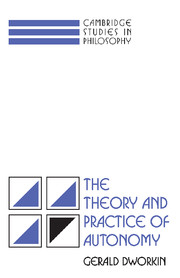Book contents
- Frontmatter
- Contents
- Preface
- Acknowledgments
- PART I THEORY
- PART II PRACTICE
- 6 Consent, representation, and proxy consent
- 7 Autonomy and informed consent
- 8 Paternalism: some second thoughts
- 9 The serpent beguiled me and I did eat: entrapment and the creation of crime
- 10 Behavior control and design
- Epilogue
- Bibliography
- Index
6 - Consent, representation, and proxy consent
Published online by Cambridge University Press: 05 June 2012
- Frontmatter
- Contents
- Preface
- Acknowledgments
- PART I THEORY
- PART II PRACTICE
- 6 Consent, representation, and proxy consent
- 7 Autonomy and informed consent
- 8 Paternalism: some second thoughts
- 9 The serpent beguiled me and I did eat: entrapment and the creation of crime
- 10 Behavior control and design
- Epilogue
- Bibliography
- Index
Summary
INTRODUCTION
The moral and practical issue that is raised by proxy consent is the issue of when one individual may make decisions about, speak for, and represent the interests of another. In the case of a fetus, or a young child, or a mentally retarded person, or an unconscious person, or a person in great mental distress, or a person who has been found “unfit” to perform certain obligations and duties, the individual whose interests are to be secured and rights protected is viewed as not in a position to, not competent to, make certain important decisions. The issue of proxy consent is one of who shall be authorized to make those decisions and what criteria should guide the proxy in making such decisions.
The issue of proxy consent can arise in many different contexts. We might be concerned with the financial responsibility of a senile individual. We might be concerned with the legal powers of a guardian with respect to his or her ward. We might be concerned with who will be best able to look after the interests of a minor child. In this chapter we are primarily concerned with the issue as it arises in the biomedical context, and in particular, as it arises with respect to children and their parents. Thus we are concerned with third-party authority to make decisions about the use of children in medical treatment and research.
- Type
- Chapter
- Information
- The Theory and Practice of Autonomy , pp. 85 - 99Publisher: Cambridge University PressPrint publication year: 1988
Accessibility information
- 1
- Cited by

